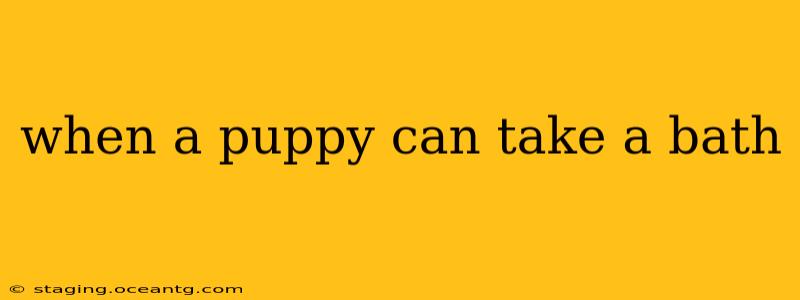Bringing home a new puppy is an exciting time! But with all the joy comes the responsibility of proper care, and one of the first questions many new owners have is: when can my puppy take a bath? The answer isn't as straightforward as you might think. It depends on several factors, and rushing the process can be detrimental to your puppy's health and well-being. This guide will walk you through everything you need to know about bathing your puppy safely and effectively.
How Often Should I Bathe My Puppy?
This is a crucial question, and the answer isn't "as often as you like." Over-bathing can strip your puppy's skin of its natural oils, leading to dryness, irritation, and even skin infections. Generally, you should bathe your puppy only when absolutely necessary, such as when they've rolled in something particularly smelly or muddy. For most puppies, every 4-8 weeks is sufficient.
However, certain breeds with specific coat types might require more frequent baths. Consult your veterinarian or a professional groomer for advice tailored to your puppy's breed and coat.
What Age Can I Start Bathing My Puppy?
Before addressing the frequency, let's tackle the age. Avoid bathing your puppy before they are at least 8 weeks old. Their immune systems are still developing, and early baths can increase their vulnerability to illness. Furthermore, puppies at this age are often still adjusting to their new environment and require time to settle in.
What if My Puppy Gets Really Dirty Before 8 Weeks Old?
Accidents happen. If your puppy gets exceptionally dirty before the 8-week mark, you might need to spot-clean them instead of a full bath. Use a damp cloth to gently wipe away the dirt. Focus on the affected areas, avoiding getting their ears or eyes wet.
How Often Should I Bathe a Puppy with Allergies?
Puppies with allergies require extra care. Frequent bathing can exacerbate their allergies, so it's best to bathe them only when absolutely needed, and always use a hypoallergenic shampoo specifically formulated for sensitive skin. Consult with your veterinarian to determine the best bathing frequency and appropriate shampoo for your puppy's specific allergy.
What Kind of Shampoo Should I Use for My Puppy?
This is another crucial aspect. Never use human shampoo on your puppy. Human shampoos are too harsh for their delicate skin and can lead to dryness, irritation, and other problems. Always use a puppy-specific shampoo that's gentle and formulated for their sensitive skin. Look for shampoos that are tearless and hypoallergenic.
What are the Best Practices for Bathing My Puppy?
- Use lukewarm water: Avoid hot or cold water, which can be uncomfortable and even harmful to your puppy.
- Be gentle: Puppies are delicate, so handle them gently throughout the bathing process.
- Protect their ears and eyes: Avoid getting water in their ears and eyes, which can lead to infections.
- Rinse thoroughly: Any remaining shampoo can irritate your puppy's skin.
- Towel dry: Gently towel dry your puppy, and consider using a hairdryer on a low, cool setting if needed. Always keep a safe distance to avoid burning.
By following these guidelines, you can ensure your puppy enjoys bath time while maintaining their health and hygiene. Remember, consistency and gentle handling are key! Always prioritize your puppy's comfort and well-being.
